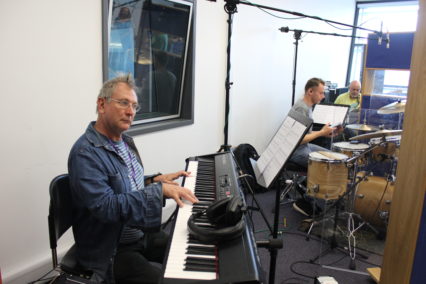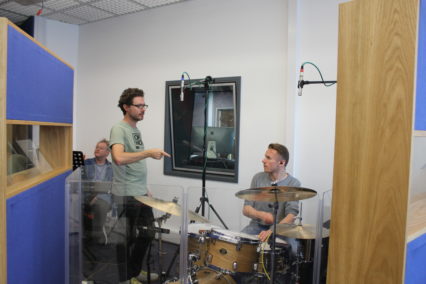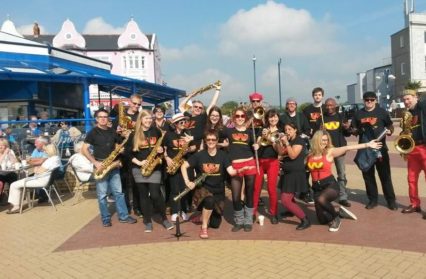Since 1992 Wonderbrass has been a platform for encouraging amateur musicians into the professional performance sphere. Led by multi-instrumentalist and composer Dr Rob Smith and drummer Mark O’Connor, Wonderbrass has a unique set-up: anyone who can play an instrument is welcome to join the band for rehearsals and when their playing and knowledge of the band’s repertoire is up to standard, members are invited to perform at professional gigs.
Wales Arts Review caught up with Wonderbrass band member and promoter Jenny Allan, to find out more about this eclectic bunch.
Tell us a little bit about how rehearsals work – are they chaotic, or does everyone “get it” quite quickly? Any good stories from rehearsals over the years?
 Rehearsals can be chaotic but that’s the joy of them – that’s what sets Wonderbrass aside from many more serious rehearsal environments members have experiences in orchestras and choirs etc. Sometimes we learn new songs from sheet music, other times we learn by ear. Some sessions focus on understanding and practising improvisation and jazz theory.
Rehearsals can be chaotic but that’s the joy of them – that’s what sets Wonderbrass aside from many more serious rehearsal environments members have experiences in orchestras and choirs etc. Sometimes we learn new songs from sheet music, other times we learn by ear. Some sessions focus on understanding and practising improvisation and jazz theory.
With so many different styles of learning new material and of course learning how to shape that material to your own expressive needs (it is jazz-based music after all) through improvisation everyone is used to finding some things easy and other things challenging. It’s the mutually supportive environment that gets participants through this.
The different styles of session play to the strengths of different members; some people come to us from a classical background and are often uncomfortable with improvising, or playing without music. Other people are less comfortable with sight reading – there’s something to challenge everyone and we’re all learning all the time, but because it’s such a social and encouraging space people feel comfortable enough to try, fail and improve together.
Rehearsals are also a space where people make and develop lasting friendships. Break time is full of chatting, laughing, swapping stories,clothes or home-grown vegetables, as well as helping each other understand rhythms or patterns they are struggling with or planning social events.
Where will we find Wonderbrass performing? What does the band do best?
Our gigs range from carnival style street performances, to internationally acclaimed festivals, concerts and events all over the world. We’ve performed in Budapest, Barcelona and Stuttgart, to name just a few places.
The band’s ethos is to make musical participation in a professional capacity accessible to musicians from all backgrounds and to remove the barriers of elitism and having the time and money to invest in a conventional course. Everyone is welcome and all are encouraged to develop their musical ability in a safe, non-judgemental social space.
 Our music comes from all sorts of places and can include covers of long-time favourite songs (Accent on Africa – heard on the only cassette tape that was jammed permanently into the band’s minibus tape player), inspiration from a new or unusual instrument that someone has decided to bring along (La Isla Bonita featuring Francesca’s accordion), compositions from the band’s founder and Musical Director Rob Smith (there are too many to mention – favourites include buddy Stomp, Santes Dwynwen Shuffle…) and sometimes someone in the band will bring an original idea along.
Our music comes from all sorts of places and can include covers of long-time favourite songs (Accent on Africa – heard on the only cassette tape that was jammed permanently into the band’s minibus tape player), inspiration from a new or unusual instrument that someone has decided to bring along (La Isla Bonita featuring Francesca’s accordion), compositions from the band’s founder and Musical Director Rob Smith (there are too many to mention – favourites include buddy Stomp, Santes Dwynwen Shuffle…) and sometimes someone in the band will bring an original idea along.
Pieces can be fully worked out but sometimes people will bring a loose idea and the idea is worked on as a team. In around 2000, Derek Howells, our long-time and still-serving bassist brought in an idea called Festival City People and we were inspired by the title to make it into an up-beat Latin America’s workout where the whole band piece evolves into an out of control party. However, the original idea was quite modest, subtle and restrained. That’s just the way it happens sometimes. The journey from an idea to a finished repertoire piece can take some unexpected twists – that’s the joy of a musical collective.
“We started Wonderbrass because we wanted to have a large ensemble – a group to create and perform more ambitious arrangements.
At that time, if you went to a jazz workshop, the focus was on soloing, rather than playing together and we wanted to give people the experience of being in a mutually supportive ensemble; musical co-operation rather than competition.
People still want to solo and everybody can, but it’s a balance. You’re not just waiting for your turn to solo, you’re contributing to the music as a whole nearly all the time”
Dr Rob Smith, Musical Director
Members are then able to take what they learn out into the real world and perform among other professionals. These other players become their peers rather than representatives of an unattainable standard.
The fees the band takes from performances goes directly back into the band – no individual member takes a fee. However, the money is used to hire two professional musical tutors to lead weekly rehearsals and provide music for the band to perform.
Can you tell us a bit more about these tutorials – how they work, what they focus on? Any notable names lead them?
These weekly rehearsals are run by our musical directors Dr Rob Smith and drummer Mark O’Connor. We rehearse every Tuesday in the New Fleurs in Splott. The locals love us – especially when we play our Rolling Stones or Lady Gaga covers! We usually rehearse the material we’ll be playing at the next gig alongside learning new material. We also learn and practise jazz improvisation with exercises run by Rob or Mark – we take it in turns to try short improvisations. By the end of the exercise people tend to have a handle on it and lose their nervousness of improvising in front of people.
We also provide instruments, where necessary, for players who may want to return to playing but no longer have their own, or those who may struggle financially to provide their one, as well as to expand the potential for the band – baritone saxophones are pretty pricey and we’re lucky enough to currently have two experienced players. This means we’re always able to make a big impression when we take an acoustic band out into the streets.
Our repertoire spans music from every genre – from New Orleans street tunes, Caribbean ska beats and African township to the pop classics of Britney, the electronic sounds of Calvin Harris and the legendary hits of the Rolling Stones. A mix of original compositions and new interpretations of classic tracks.
Performances can feature any number of musicians from 12 to 30, which can make fitting onto stages problematic!
How do you come to a decision as to who plays in the band? Is it down to the requirements of the music? How many durmmers is too many drummers, for example?
There are never too many of anything in Wonderbrass! Everyone can come and rehearse and we do our best to make it work. We even had a harpist at one point. At one point in the band’s history we had 12 alto saxophones – at the same time! We manage this situation by allowing everyone to rehearse, but selecting players for gigs. Sometimes sections will alternate players at gigs, so that more people have the chance to perform, but the stage isn’t overloaded with too many of one instrument. Occasionally Rob will hand select a band, but usually we’re pretty self-regulating.
Can you tell us a bit about the Heritage Lottery Fund project Wonderbrass has been running?
In 2017 Wonderbrass turned 25. We decided that this was the perfect opportunity to invite people who are no longer in Wonderbrass back to perform with the current members, to share their Wonderbrass memories and experiences and reconnect with their Wonderpast.
We also realised that we had a huge amount of photographs, posters and memorabilia that needed to be archived.
We approached the Heritage Lottery Fund to ask for support to run a project that would allow us to achieve all of these goals over an 18 month timeline.
We launched the project with a free performance at the Gate for the Made in Roath Festival in 2017, which sold out and had people queuing around the block for entry.
We ran workshops at the University of South Wales’ Atrium campus, inviting members from throughout the band’s history to join in with some musical storytelling and collaborative composition sessions. These sessions were led, in turn, by three professional composers: Claude Deppa, a South African trumpet legend, who’s worked with the band before, Dr Rob Smith, founder and musical director of Wonderbrass and Nick Briggs, a previous Wonderbrass member who has since moved on to a career as a professional musician.
What other success stories are there from the Wonderbrass history? There must be so many personal and professional stories from over the years?
Nick Briggs went on to play with Paolo Nutini. We were invited to play the Durham international brass festival after our involvement with the 2012 Cultural Olympiad with Jason Yarde. We were invited to play in Stuttgart, twinned with Cardiff – after being seen playing outside Cardiff Castle at Tafwyl. Both of these experiences really helped the band to bond and to consolidate a lot our material and cohesion as a unit. We met musicians from all over the world and learned a lot from the other performers. This had a direct impact on the way the band performs to this day.
During these sessions we developed nine new tunes to add to the Wonderbrass repertoire, which incorporated ideas from the bands history and ethos. We also interviewed band members to create several documentary films to share online.
We showcased the new music at a free celebratory performance at The Gate, again for Made in Roath, where members past and present were invited up on stage to perform for a sell-out crowds in 2017 and 2018. The compositions will be freely available online.
We made a music video for one of the new compositions – Dr Rob Smith’s Santes Dwynwen Shuffle and archived audio interviews, photographs and other memorabilia with People’s Collection Wales.
Wonderbrass has come to mean a lot to its members and people were enthusiastic to share their thoughts and feelings about what Wonderbrass means to them. Some have gone on to careers as professional performers themselves. Others were prompted to rejoin the band after reconnecting through the project.
“I’ve been a member for 20 years…I work… as a journalist and I was able to become a music presenter of jazz shows based on my experiences with Wonderbrass. What I know about jazz I’ve learned through Wonderbrass… It’s given me the musical training to go out and do anything”
Wonderbrass member
“…before I joined Wonderbrass I wouldn’t have considered myself a musician of any kind. But now we play all these gigs and festivals people know me for my trumpet playing…I think in that respect it’s changed my sense of identity”
Wonderbrass member
“I loved learning to solo in Wonderbrass. At first it’s scary and intimidating because everyone is so good and you don’t really know what you’re doing. But then people are so supportive and encouraging you find the space to try, to learn. You practice soloing with feedback from your peers until suddenly you’re on stage at Brecon Jazz soloing in front of thousands of people!”
Wonderbrass member
We are now closing the project with a showcase of the documentary films created with Laurence Hall as part of the project. These feature interviews with Wonderbrass members past and present, gig footage, photographs from the band’s history and behind the scenes glimpses into Wonderbrass life. This will take place on 6 September 2019 at 18:00, USW’s Atrium campus.













